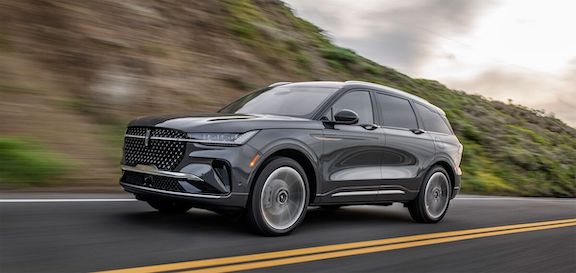Ford Motor Co. plans to import its restyled Lincoln Nautilus sport-utility vehicles from China, deepening connections to a country other US companies are abandoning.
The SUVs, which will hit the US market next year with a sleeker look and a new electric-gasoline hybrid powertrain, will be the first model Ford imports from China. Its plant in Hangzhou — a joint-venture with China’s Changan Automobile — already makes Nautilus vehicles for the Chinese market.
The move is expected to draw scrutiny as geopolitical tensions between China and the US escalate. Other American companies, such as Apple Inc. and auto suppliers, are looking to exit China. And politicians are already assailing Ford for a battery plant it’s building in Michigan, which will license technology from China’s Contemporary Amperex Technology Co. Ltd.
“Given the environment today, having a vehicle sourced from China may be a risky decision,” said Jeff Schuster, president of the Americas for researcher LMC Automotive. “There’s a potential for backlash.”
Ford’s Detroit-based rival General Motors Co. also imports a single model from China — the Buick Envision compact SUV, which it has exported to the US from a Chinese factory since 2016.
Ford has no choice but to import the vehicle because all its American plants were taken, Lincoln President Dianne Craig said in an interview Monday. The Canadian plant where Nautilus vehicles are currently built for North American buyers is being retooled next year to manufacture electric vehicles.

“We’re already building Nautilus in China,” Craig said. “It just made sense to centralize our Nautilus production.”
About 35% of the Nautilus SUVs the Hangzhou plant makes will ship to North America, mostly the US, according to the company. Craig said China has become “very important” to Lincoln, accounting for about half its global sales, but that Ford remains the largest automotive manufacturer in the US.
Electric Delay
Lincoln could also face criticism for not offering a fully electric version of the new Nautilus. Ford’s luxury brand failed to deliver on a promise to have an electric vehicle in its lineup by the end of last year, and is now one of the only premium players without a battery powered model. In the luxury car market, electric vehicles account for about 25% of sales.
Lincoln officials contend their customers aren’t asking for a full-electric vehicle and instead are craving a hybrid or just want to stick with traditional internal combustion engines. The new hybrid Nautilus will have a 100-kilowatt battery mated to a 2.0-liter turbocharged engine and won’t plug in. Lincoln will also sell the SUV with a conventional gasoline engine.
“We are going to bring EVs to market when we are ready,” Craig said, without committing to a date. “We’d rather be late and get it right.”
Ford’s main focus is to boost US sales of the Nautilus, which fell to 20,635 last year, from 31,016 in 2019, its first full year on the market. The vehicle ranks 10th in the mid-sized premium SUV segment with a market share of just 3.4%, according to LMC Automotive. Toyota Motor Corp.’s Lexus RX, BMW’s X5, the Mercedes GLE and Tesla’s Model X dominate the category.
To attract younger buyers the new Nautilus will also include an 48-inch panoramic digital dashboard, an 11-inch touch screen between the front seats and the latest version of its BlueCruise hands-free driving system. It starts at $51,810, up almost $5,600 from the $46,220 base price of the outgoing model.
Ford will begin taking orders Monday, 10 months before the new Nautilus is released.

Follow us on social media: